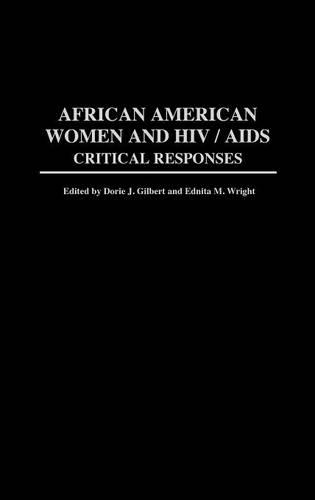
African American Women and HIV/AIDS: Critical Responses
(Hardback)
Available Formats
Publishing Details
African American Women and HIV/AIDS: Critical Responses
By (Author) Dorie J. Gilbert
Edited by Ednita M. Wright
Bloomsbury Publishing PLC
Praeger Publishers Inc
30th March 2003
United States
Classifications
Tertiary Education
Non Fiction
Gender studies: women and girls
Ethnic studies / Ethnicity
362.1969792008996
Physical Properties
Hardback
288
Description
Examines the impact of HIV/AIDS among African American women. AIDS is the second leading cause of death among African American women between the ages of 18 and 44, and African American women constitute 63 percent of all cases of AIDS among women in the United States. This volume brings together the collective wisdom of scholars, researchers, and social work professionals dealing with these concerns, and it seeks to focus attention on the primary population of women impacted by AIDS and to present culturally senstive responses that meet the specific needs of African American women. The collection begins with an historical and current overview of the alarming HIV infection rate among African Americans, in particular women. The remaining chapters highlight HIV/AIDS prevention and intervention strategies that are successfully impacting the African American population. Grounded in social construction theory, social work theory and practice, and guided by a feminist perspective, the volume seeks to privilege the voice of African American women, the group that is the most disenfranchised and least represented accurately in AIDS-related research and writing. This is an important guide for scholars, students, researchers, and practitioners involved with HIV/AIDS issues in the African American community, and with women's and black studies.
Reviews
An outstanding book that brings forth the issues that are confronting the Black communities throughout the United States. Researchers will be able to build on what is presented and present new ideas on how to combat this disease in the urban and poor areas of the United States where so many of the Blacks now reside. Highly recommended for all academic libraries.-Aids Book Review Journal
Gilbert and Cornell University dean Wright have collected 15 well-researched articles on the state of African American women affected by HIV/AIDS. The essays address socioeconomic factors surrounding the epidemic and explain programs that have been successful in fighting the spread of the disease. Most appropriate for academic and health sciences libraries.-Library Journal
This book is chock-full of very bad news. This book puts the pandemic right in your face, and it becomes harder to turn away. Yet I emerged from it feeling energized, because it is a call to action, a homage to hope, a celebration of survival. It is a book of revelation, restoration, and resilience.-Journal of HIV/AIDS & Social Services
"Gilbert and Cornell University dean Wright have collected 15 well-researched articles on the state of African American women affected by HIV/AIDS. The essays address socioeconomic factors surrounding the epidemic and explain programs that have been successful in fighting the spread of the disease. Most appropriate for academic and health sciences libraries."-Library Journal
"This book is chock-full of very bad news. This book puts the pandemic right in your face, and it becomes harder to turn away. Yet I emerged from it feeling energized, because it is a call to action, a homage to hope, a celebration of survival. It is a book of revelation, restoration, and resilience."-Journal of HIV/AIDS & Social Services
"An outstanding book that brings forth the issues that are confronting the Black communities throughout the United States. Researchers will be able to build on what is presented and present new ideas on how to combat this disease in the urban and poor areas of the United States where so many of the Blacks now reside. Highly recommended for all academic libraries."-Aids Book Review Journal
Author Bio
DORIE J. GILBERT is an Assistant Professor at the Center for Social Work Research, University of Texas at Austin. She is co-editor of Bulletin of HIV/AIDS in Social Work. EDNITA M. WRIGHT is Director of Diversity and Outreach Services for Gannett Health Center, Cornell University.
